May 24, 2025 | 16:23 GMT +7
May 24, 2025 | 16:23 GMT +7
Hotline: 0913.378.918
May 24, 2025 | 16:23 GMT +7
Hotline: 0913.378.918
As the daughter of the Minister of Agricultural Farming, Ngo Tan Nhon, she works outside the agricultural sector. The change only started when she had cancer at the age of 49, it metastasized before she could be cured, everyone thought she would not be able to survive because of increasing infections, she went from weighing over 50 kg to just about 30 kg. By chance, thanks to a Southern medicine recipe by a (now deceased) physician, she miraculously escaped death, and from then on, she realized that Southern medicine is precious and clean food is the key.
At the time, the Institute of Biomedical Physics of Japan proposed to the Vietnam Academy of Science and Technology where she was employed to set up a program on plant protection chemical safety: “I worked as a consultant for them for profit and then set up a database on chemical safety and plant protection based on elaborate investigation, analysis and data synthesis for 2 years but unfortunately specialized agencies that were introduced to the database at the time had not utilized it. Each active ingredient has multiple chemical names, farmers wouldn't know for certain without a clear database to look up.
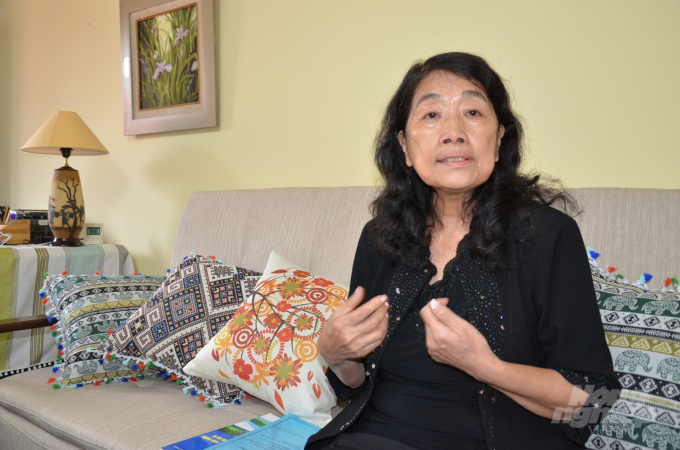
Dr. Ngo Kieu Oanh. Photo: Duong Dinh Tuong.
I want to establish a model for managing and promoting safe vegetables because those are the key targets in using chemicals. The way that records of origin are handled currently is not perfect because it cannot regularly record details in the farming process such as fertilizer, spray amount, crop type, pests problems... In the 2000s, although I am not a farmer, I still go to agricultural fairs, meet leaders from central to local government to introduce the model and naively think that they will invest in my models. But unfortunately no one noticed.
Until, I met the Director of Ba Ria-Vung Tau Department of Science and Technology, he said that he was assigning the Phuoc Hai vegetable area a few computers to calculate the management but was struggling to implement. After hearing my presentation, he immediately invited me to help. It was the year 2005.”
It started with a small project, she then used her own money to help establish a cooperative of safe vegetables with full production processes. After striving in this field for a few years, even though it was practical, the model was frequented by many visitors and it was awarded a certificate of merit by the President of the province, yet the output was still difficult because of the high price. She used to go to various supermarkets to sell goods, but at first they only took the brand name and then replaced with other vegetables. It is the collusion of three parties: accountants, buyers and leaders. The cooperative was dissolved, properties could not be recovered, she lost about 500-600 million VND - a huge amount at that time. After finishing the project, she retired, thinking of making her own safe vegetables, from chemically to completely organic.
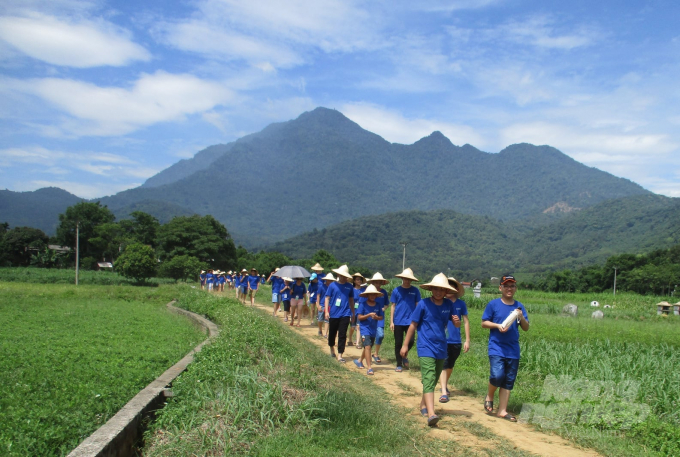
Students visiting to experience at Dong Que farm. Photo: Documentation.
When researching the Ba Vi area, Hanoi, it was advantageous that the Vietnam Academy of Science and Technology has 24 member institutes, so she often invited colleagues who are geographical experts to accompany her. She asked them the area is relatively small but the trees are lush, thousands of years ago when the sea receded, the ancient Vietnamese brought rice seeds down to sow along the river and stream.
In 1836, French botanist Balansa, on a visit to Vietnam to study medicinal plants, he first went to a Ba Vi forest and in 1940 a French landowner also brought the first dairy cow here. Following that, we introduced chickens, ostriches, goats, sheep, rabbits... to this area. The geographers believed that the 3 peaks of Ba Vi mountain are the 3 towers capturing the energy of the universe, close to the foot of Ba Vi mountain are the clean currents of Da river water.
Since then, she had the idea to build a concentrated, natural food production and supply area of 5 districts around the foot of Ba Vi mountain and along with scientists to conduct field investigations, build natural resources maps…
Because she wanted to protect some of Ba Vi's heritage, in 2009 she bought 1 hectare of land to grow organic vegetables. When I read documents on rural tourism in the world, I liked them very much: “During my research in the Ba Vi area, I have found an invaluable resource for the development of rural tourism, which are livestock and crop villages. Due to the linkage and cooperation to create a community of households making ruraltourism products together in their hometown, there is a great need for an operation center to provide information for visitors and train service skills for farmers.
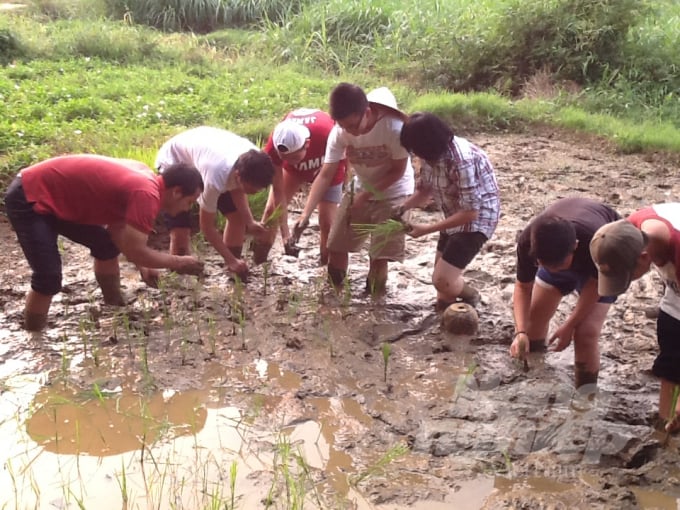
Rice farming experience.
My Dong Que farm is both a reception facility and an operating center. On the other hand, even with investment capital, I still want to associate with surrounding villages and farms because rural tourism has three characteristics: First, the community, even investors cannot "pressure" the locals because they would not let the investors in; The second aspect is equality of economic benefits; The third is sustainability because the farmers contribute their knowledge, the fields and farms are theirs, we don't have to manage them.
We employ 10 employees, all of which are farmers. It is not possible to bring people from the city to do rural tourism experiences such as planting rice, catching fish and growing vegetables as well as my employees. Only training on the spot is needed, enhancing tourism skills, they still live day-to-day with agriculture, with their culture. I hired an Australian expert to stay on the farm for 3 months and write a private lecture for tourism farmers, as a room, as a desk, as a guide, as a receptionist, the training methods must be different. Professionals teach them how to work in groups, together. My chef can still drive agricultural vehicles when needed, or make fertilizer, grow vegetables.
The farm's main customers are students. There are 6 topics such as diverse nature, we let them go into the forest to experience how the humus layer is a storehouse for water, how to create waterfalls and streams, how water flows to the Da River. The theme of Southern medicine is associated with the famous Southern medicine villages in Ba Vi. Duong Lam ancient village theme. Animals theme such as goats, cows, rabbits, ostriches, bees...
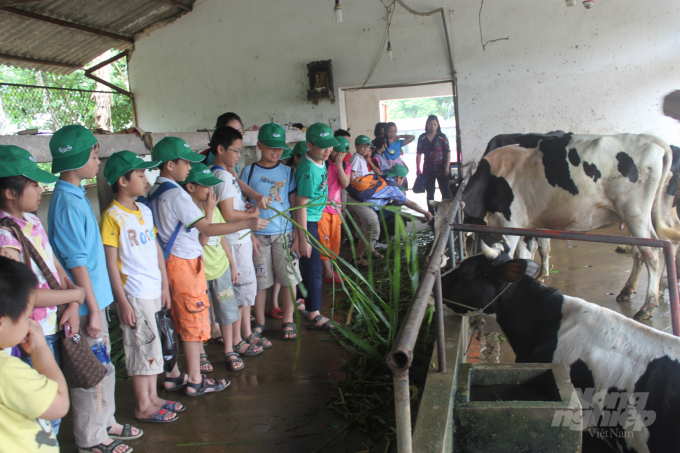
Cow feeding experience. Photo: Documentation.
The theme of wet rice civilization, teaching students about ancient farming tools to know the process of making rice grains, transplanting, brooding fish and baking straw. There are big schools like Unis with tuition fees of billions of dong/year, mainly children of officials of international organizations or rich Vietnamese parents who have chosen to accompany Dong Que farm for many years because I visited the school's leader before saying: "Because you train global citizens, they must know about the culture of the country in which you live. Vietnam is an agricultural country, so we must send the message that agriculture is not backward and dirty, the ancient people of old knew how to use ingredients from the nature, the power of nature, to make food".
Unis School also created a very good theme when bringing students to experience on the farm: “What do you hear from Vietnamese agricultural culture through the noises of farm tools, through the sounds of the mud when you plant rice". The students wrote that when they saw the mud, they were very afraid of dirt, but when they touched with their feet, they felt the smoothness, the sloshing sound was very pleasant; When they plant rice, they understand that their back hurts from bending for so long, so they appreciate every grain of rice, the sound of the mill, the sound of the pestle pounding the rice.
And combined together, they are the voice of a Vietnamese agriculture tracing back to the past. And these lines were written by a child with foreign parents! I am also the one who suggested to Deputy Prime Minister Vu Duc Dam to promote organic agriculture and rural tourism as well as thanking him for noting this”.
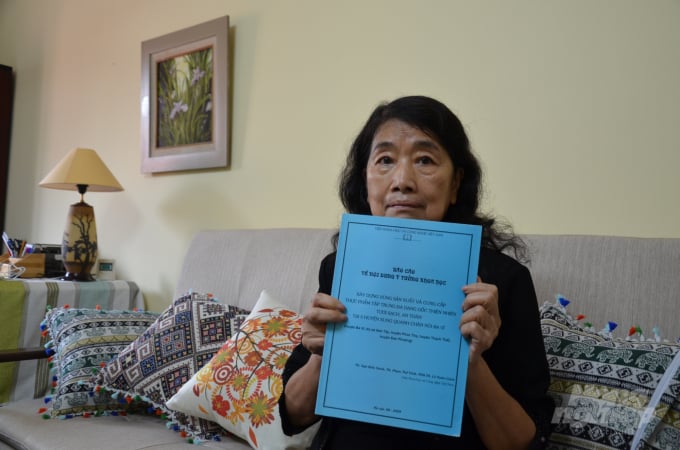
Dr. Ngo Kieu Oanh reporting on Ba Vi organic farming area. Photo: Duong Dinh Tuong.
But now Ba Vi has changed entirely due to the land fever. Before Lunar New Year, she used to take Mr. Ta Van Tuong - Deputy Director of Hanoi Department of Agriculture and Rural Development to see how Ba Vi is being chopped up. Inner-city people rushed to purchase lands, build walls to block all garden plots and gardens, disrupting the landscape that is typical of Ba Trai tea village. Traditional agricultural villages, which have produced long-standing products, have transformed into commodities, becoming markets, and now when new, non-agricultural people visit the region, they only worry about real estate, then who can still feel secure in the agricultural sector and what strategy can the State employ here?
The population structure changes, it is possible that the older occupations will gradually disappear without much practitioner. But Vietnam differs from many countries in the world in that we have a large number of craft villages. A product that wishes to be engaged in tourism must have historical and cultural properties. That history and culture begins with cultivation, animal husbandry, preliminary processing, processing and sales services. It is also possible to do rural tourism on large farms, but by that time the cultural and historical significance will have been gone.
“I am disappointed with Ba Vi in that, in the issue of community tourism, the State has to play a constructive role, no one else can perform it. Ten years before the pandemic, every year at conferences and fairs, I brought up documents to convince Ba Vi to engage in community tourism, but they were not interested and only paid attention to the giants, the big investor with large ecological zones. Doing community-based tourism is difficult because the political system must also be determined to participate, build infrastructure for the farmers, organize training on tourism skills for farmers, as a result, make excellent, beautiful products, ensuring security and the environment…”
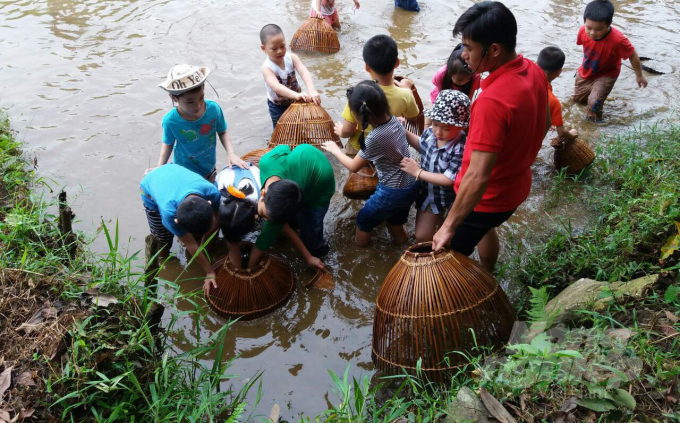
Fish catching experience. Photo: Documentation.
When Ms. Oanh lamented "Ba Vi is finished, it's been three months and although I live in Hanoi, I don't visit the farm anymore" I asked why, she said besides the fact that Ba Vi was being chopped up, she didn't want to visit the farm to avoid land agents soliciting to buy the farm. I asked, 1 hectare of residential land of the farm according to the current market price must be worth several tens of billions, why not sell it, she replied: “What do I need the money for? My farm can contribute to the country a concrete model combining agriculture and tourism, educating on community, equality, sustainability, standards, regulations, procedure. There is a combination of cultivation and animal husbandry, along with ecology, history and culture.
I've managed to go so far, how can I quit when it hasn't really become the right career, hasn't been put into practice widely, and applied by many locations to increase income for farmers. Many people are interested in rural tourism, but only for the purpose of taking the land to make it into a very large farm, stuffing all kinds of mess into it. It's tourism as an industry, not community tourism."
In life, the lesson of failure is just as important as that of success. Because there is no State policy on rural tourism, as well as a set of standard criteria, there are farms combining tourism and agriculture that have gone bankrupt, such as Ba Vi white goat farm receiving a private investment of hundreds of billion, illegally built resort villas on farmland.
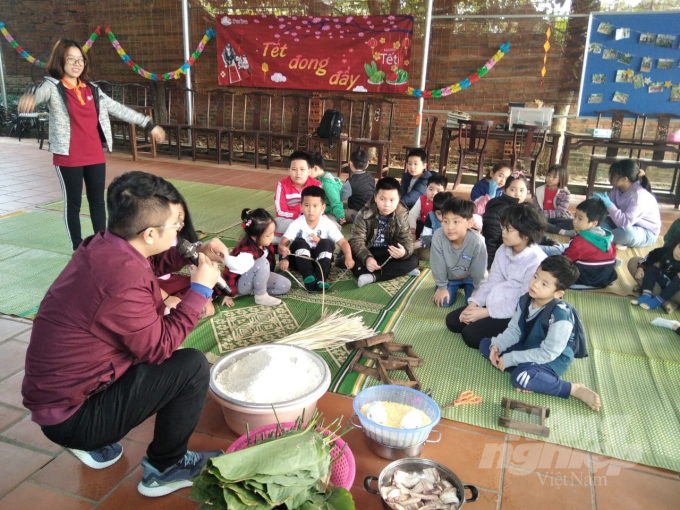
Banh chung wrapping experience. Photo: Documentation.
She continued: “To prove that Vietnam can build organic agriculture from the traditional self-sufficient economy, I went to Ha Giang and also wanted to build a model of rural tourism here, but they still refuse after many years. When I went to Lam Binh district, Tuyen Quang province, I saw that the leaders really wanted to do rural tourism, so I helped for 4 years and now I have come to Na Hang district.
These areas have potential for agro-ecology, are fully qualified for organic food production and the economy is still self-sufficient, so the impact from chemicals is not significant. The problem was to reorganize production.
When I went to Lam Binh, Na Hang, I realized that the wet rice civilization had been split in two, but the root in in the mountains, not in the plains. Additionally, the region already has a commodity area for goats, lake fish and is evolving into a medicinal area. Later, when the Mekong and Red River Deltas are flooded due to climate change, it is forecasted that in 2050, such mountainous areas will be an invaluable food storage for the country, we must return there, we must cherish it and we must protect every meter of land and forest.
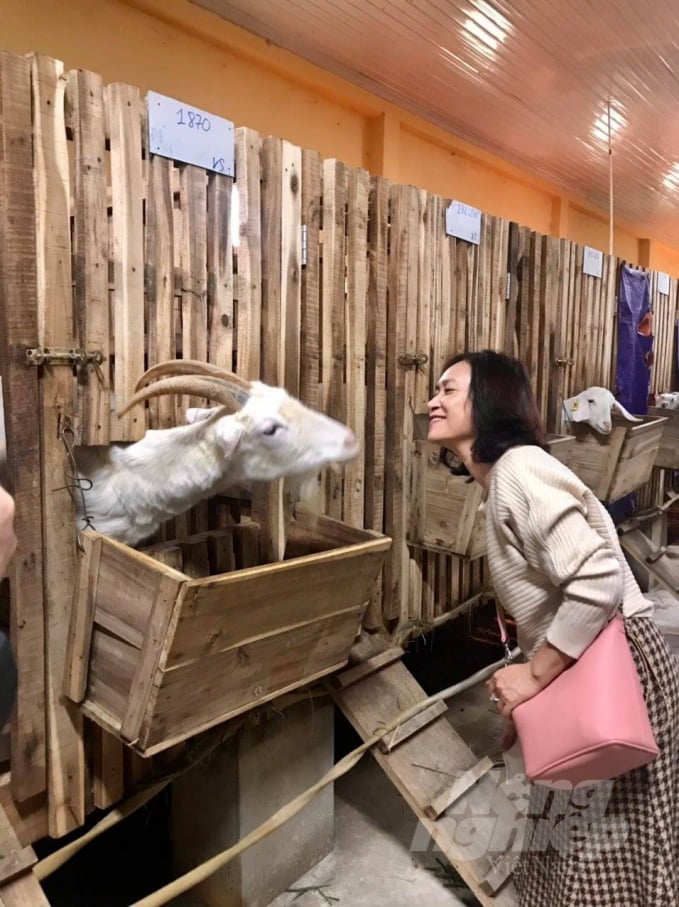
Goat farm experience. Photo: Documentation.
Climate change has come crashing down, my hometown in Tien Giang is no longer growing fruit trees, only a few coconut trees. As a scientist, I have seen all of that, but people usually won't believe when I talk of events too far ahead. But what's missing in the region? Firstly, traffic is very difficult. I brought 5 investors up including 3 pharmaceutical companies, 2 food companies, I even had to go to Nam Dinh to convince them but all had turned their backs.
Since then, it turns out that these areas lack preservation, preliminary processing and processing technology and must be suitable for small-scale, cooperative groups and cooperatives. During social distancing, I researched on small and micro businesses from Japan and Germany that emphasized on convenience and savings, so I wrote a proposal. When I met the Director of the Vietnam Institute of Agricultural Engineering and Post-harvest Technology, he was introduced to the super-fast freezing technology to prevent cell breakage and small packaging technology, so I proposed to help with the goat and lake fish area in Lam Binh and Na Hang. We have protected the above 2 species, this year we will deploy so that besides goats, fish, many other foods can also be frozen.
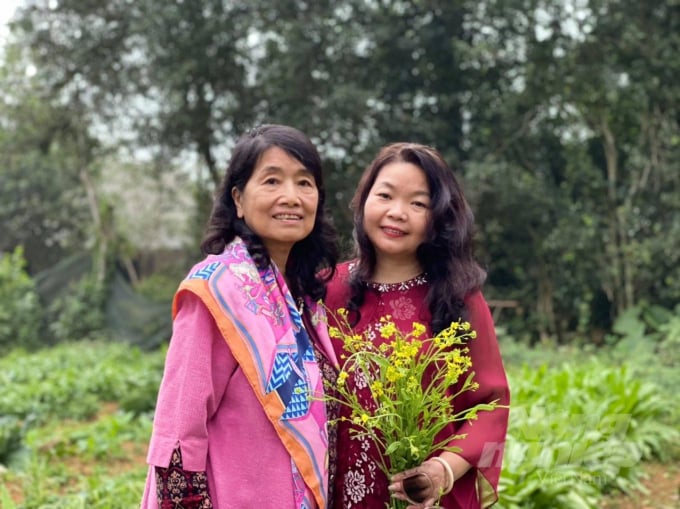
Dr. Ngo Kieu Oanh at the organic vegetable garden. Photo: Documentation.
Rural tourism is not only an experience, done by each farm worker, but like in the case of Nam Dip, Lam Binh district, the whole family also participates. When I went up there, I said: "Your house has everything from wine brewing, weaving, trees planting ..., the scenery is also beautiful, but it has to be rearranged so that it can ne neat and clean, the kitchen, the sleeping area, the weaving area, the vegetable garden… all must be separate”. Everyone has their own job in tourism, the old grandparents clean and sweep all day long, the daughters, daughter-in-laws weave cloth, the sons raises fish, pigs and does gardening. The whole community participates and I check those out.
However, the weakest link is still the lack of skills, lack of capital, the need to create processes, standards, infrastructure, culinary dishes are not diverse, presentation is not beautiful and delicate even though the ingredients are excellent and fresh…”
Translated by Hai Long
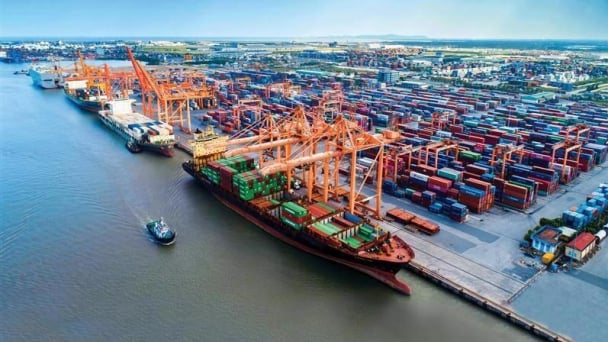
(VAN) South Korea is currently the second-largest investor in Hai Phong in terms of the number of projects (186 projects) and the largest in terms of total registered investment capital, reaching USD 14.2 billion.
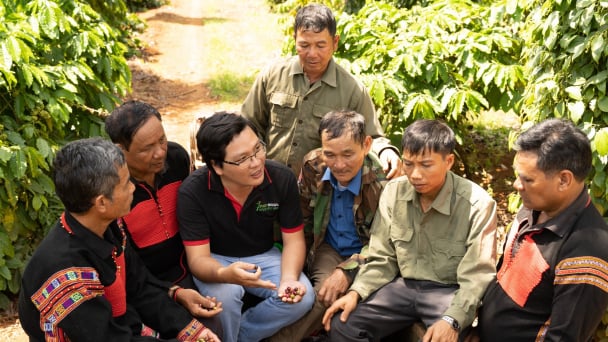
(VAN) As consumers become more environmentally conscious, legal regulations grow increasingly stringent...
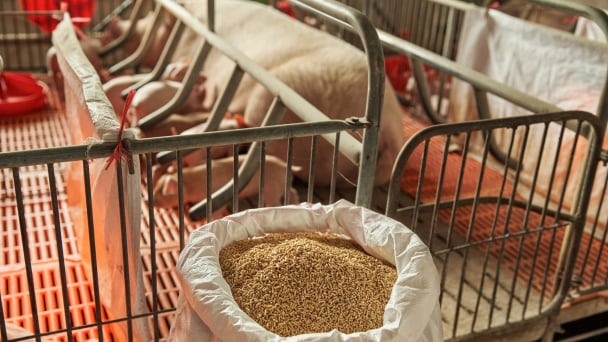
(VAN) CJ Feed&Care officially launched the FCR improvement campaign called “2025 Find Challenge Reach” in April 2025. In Vietnam, this campaign is implemented by CJ Vina Agri.
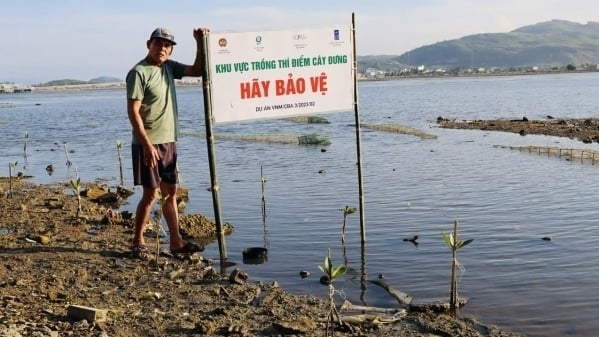
(VAN) The swamp in Pho Thanh is gradually being covered with red mangrove, creating a favorable environment for producing clean, high-quality salt.
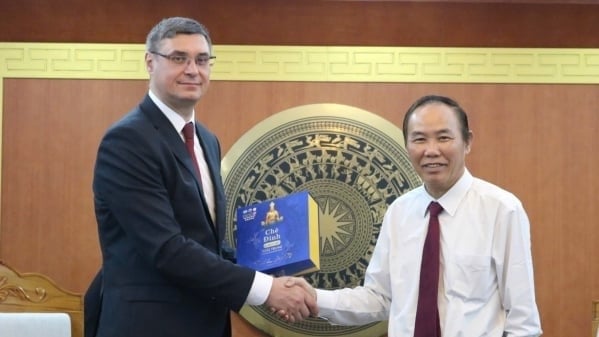
(VAN) The trade turnover of agro-forestry-fishery products is growing significantly, along with investment cooperation commitments that are opening up new development directions between Vietnam and Russia.

(VAN) Khanh Hoa is investing over 545 billion VND to develop 240 hectares of high-tech marine aquaculture in order to guarantee a consistent supply of seafood exports and achieve the USD 1 billion target.

(VAN) Minister of Agriculture and Environment Do Duc Duy held a meeting with Soopakij Chearavanont, Chairman of C.P. Group, on May 15.